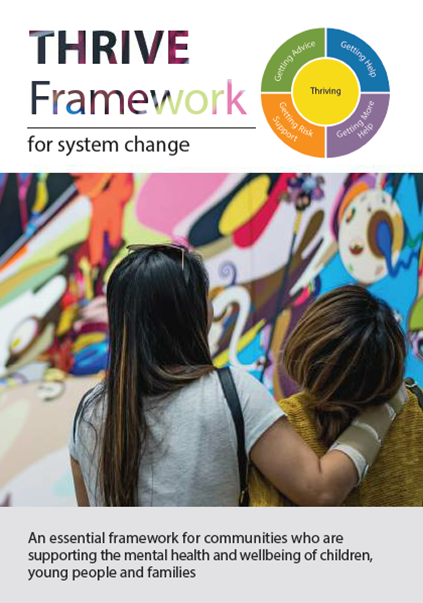At a glance: Helping children and young people thrive
As many as one in five children and young people experience mental health problems.
Due to unprecedented and increasing demand, child and adolescent mental health services face significant challenges, including long waiting times, fragmented service provision, and a lack of involvement of children and young people in decisions about their care.
These issues contribute to inefficiency, poor outcomes, and a negative experience for children, young people, and their families. The system is under strain, with up to 70% of children not being seen within a year of referral.
In response to these challenges, the THRIVE Framework was published as an integrated, person-centred, and needs-led approach to mental health services for children and young people. It was designed to improve access to services, enhance efficiency, and raise the overall quality of care.
Video: Learn more about the THRIVE Framework and approach
ARC North Thames supported the implementation and evaluation of the THRIVE Framework across services in England. As a result of these efforts, over 60% of children in England now live in areas where the THRIVE Framework is applied.
Our comprehensive evaluation of the THRIVE Framework revealed increased activity, and reductions in triage, assessment, and treatment waiting times. Sites also demonstrated improved efficiency, reducing the duration of patient episodes by 4% and increasing patient contacts by 30%. Face-to-face interactions saw a 37% rise.
These results highlight the THRIVE Framework's potential to enhance services and presents a scalable model for future improvements in mental health services.
The Story So Far
A system-wide effort for system-wide change
Like any significant impact on complex issues and systems, the success of the THRIVE model has been years in the making and involved a great many partner organisations and individuals.
The implementation efforts, known as i-THRIVE, employed an evidence-based approach and received expert guidance from organisations such as the Anna Freud Centre and the Tavistock NHS Foundation Trust.
The NIHR ARC North Thames contribution has been led by our mental health lead, Professor Peter Fonagy, alongside Dr. Anna Moore, and supported by our implementation partners UCLPartners.
i-THRIVE supports Integrated Care Boards (ICBs), NHS Trusts, and local authorities across the country in adapting the core principles of the THRIVE Framework into local models of care that suit their specific contexts. Sites are guided through the i-THRIVE Approach to Implementation, receiving coaching and support at each stage to successfully deliver the key elements. They can also build local capacity by participating in learning and development modules offered by the i-THRIVE Academy.
Building the evidence-base for the programme’s scale and success
In 2015, the same year the THRIVE Framework was published, the i-THRIVE programme, led by Dr. Anna Moore, was selected for the NHS Innovation Accelerator programme, which supported its adoption as a promising innovation.
Within just a few years, more than half of children and young people in England were living in areas where the THRIVE Framework was being used as the foundation for local transformation in children and young people’s mental health services.

Image: the THRIVE Framework
However, there had yet to be a large-scale evaluation to assess the impact of the THRIVE Framework compared to other transformation approaches. Nor had there been an evaluation of the i-THRIVE Approach to Implementation to determine if it was an effective and replicable method for implementing the framework.
This is where the NIHR ARC North Thames’ evaluation came in.
In addition to collecting data from NHS accelerator sites, we gathered site-level outcomes data from ten comparable non-i-THRIVE sites, matched for demographics, resources, and clinical variables.
Each of the 20 sites contributed anonymised patient-level data spanning from 2015 to 2020. This data allowed us to evaluate whether the implementation of THRIVE led to improvements in the delivery of child and adolescent mental health services.
Alongside site-level data collection, over 400 semi-structured interviews were conducted using the THRIVE Assessment Tool with both accelerator and comparison sites. We could therefore assess how effective the implementation programme was in supporting sites to adopt THRIVE principles by evaluating how ‘THRIVE-like’ their systems were at various stages.
Our evaluation revealed that i-THRIVE sites experienced:
- A 46% increase in community triage and signposting
- A 29% reduction in triage waiting times
- A 20% reduction in assessment waiting times
- An 8% reduction in treatment waiting times.
Sites also improved efficiency, reducing the duration of patient episodes by 4% and increasing patient contacts by 30%. Face-to-face interactions rose by 37%.
What happens next
i-THRIVE continues to support local services in implementing the THRIVE principles. While significant improvements have been made, children and young people’s mental health services still face many complex challenges.
The THRIVE Framework has shown great promise, and the next step will be to explore how it can be tailored to address specific areas of children and young people’s mental health, such as prevention, neurodiversity, and eating disorders.
NIHR ARC North Thames Mental Health Lead, Professor Peter Fonagy, says:
“The ARC-funded team accomplished an extraordinary feat in implementing a service transformation programme that enabled participating services to better manage the unprecedented surge in referrals to children and young people’s mental health services.
This achievement highlights the power of science-driven service redesign, demonstrating what is possible even in the most challenging circumstances.”

Image: Professor Peter Fonagy, Mental Health Lead at a recent NIHR ARC North Thames event on mental health

 24 Sep 2024
24 Sep 2024